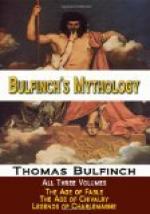ARMORICA
The next event of note is the conquest and colonization of Armorica, by Maximus, a Roman general, and Conan, lord of Miniadoc or Denbigh-land, in Wales. The name of the country was changed to Brittany, or Lesser Britain; and so completely was it possessed by the British colonists, that the language became assimilated to that spoken in Wales, and it is said that to this day the peasantry of the two countries can understand each other when speaking their native language.
The Romans eventually succeeded in establishing themselves in the island, and after the lapse of several generations they became blended with the natives so that no distinction existed between the two races. When at length the Roman armies were withdrawn from Britain, their departure was a matter of regret to the inhabitants, as it left them without protection against the barbarous tribes, Scots, Picts, and Norwegians, who harassed the country incessantly. This was the state of things when the era of King Arthur began.
The adventure of Albion, the giant, with Hercules is alluded to by Spenser, “Faery Queene,” Book IV., Canto xi:
“For Albion the son of Neptune
was;
Who for the proof of his great
puissance,
Out of his Albion did on dry
foot pass
Into old Gaul that now is
cleped France,
To fight with Hercules, that
did advance
To vanquish all the world
with matchless might:
And there his mortal part
by great mischance
Was slain.”
CHAPTER III
MERLIN
Merlin was the son of no mortal father, but of an Incubus, one of a class of beings not absolutely wicked, but far from good, who inhabit the regions of the air. Merlin’s mother was a virtuous young woman, who, on the birth of her son, intrusted him to a priest, who hurried him to the baptismal fount, and so saved him from sharing the lot of his father, though he retained many marks of his unearthly origin.
At this time Vortigern reigned in Britain. He was a usurper, who had caused the death of his sovereign, Moines, and driven the two brothers of the late king, whose names were Uther and Pendragon, into banishment. Vortigern, who lived in constant fear of the return of the rightful heirs of the kingdom, began to erect a strong tower for defence. The edifice, when brought by the workmen to a certain height, three times fell to the ground, without any apparent cause. The king consulted his astrologers on this wonderful event, and learned from them that it would be necessary to bathe the corner-stone of the foundation with the blood of a child born without a mortal father.




